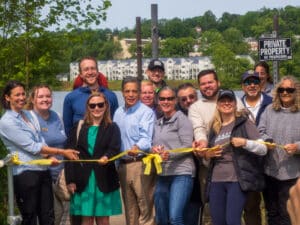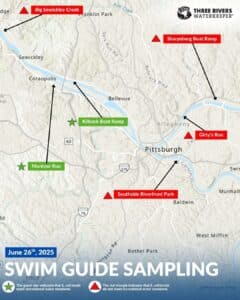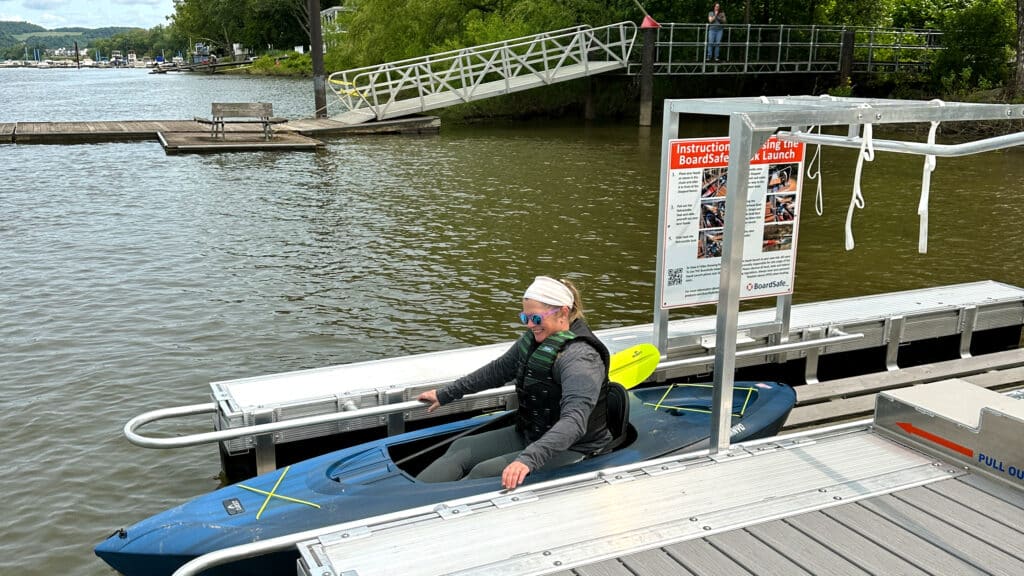Temperatures aren’t the only thing increasing around Pittsburgh. Thanks to the hard work of PEC’s partners, recreation access on the Allegheny River Water Trail has seen exciting improvements this summer, with new ADA-accessible docks and innovative public programming.
The infrastructure and events are connecting more people to the waterways around Pittsburgh, highlighting the benefits that come with clean water, healthy ecosystems and equitable access to the outdoors.
Downtown Launch
It’s fitting that one of the newest access points showcasing the beauty of the Allegheny River lies near the Rachel Carson Bridge, named for the pioneer of the modern environmental movement. The dock is the product of Venture Outdoors, a Pittsburgh-based nonprofit with the goal of removing barriers to the outdoors and connecting people with the benefits of outdoor recreation.
The project was funded in part by the Ohio Basin Access for Canoes and Kayaks Mini-Grant Program (OBACK) from the Pennsylvania Organization for Watersheds and Rivers (POWR), an affiliate of PEC. It marks the first ADA-accessible dock in the downtown area. People can rent from a fleet of kayaks and paddleboards or launch their own. Four launches allow people to self-launch, or staff are available to lend a hand.
“Our mission is to remove barriers and create access to outdoor experiences, and we think this downtown dock does exactly that,” Venture Outdoors Executive Director Ash Andrews told CBS Pittsburgh.
The dock is located under the convention center and accessible from the Three Rivers Heritage Trail. Venture Outdoors expects about 10,000 visitors annually, reflecting the growing popularity of paddling in the Pittsburgh area.
Programming at the dock includes classes that cater to a variety of skill levels, group trips, and special events such as firework floats during Pittsburgh Pirates games.
Verona Kayak Launch
On June 1, PEC joined an opening ceremony for a new public, ADA-accessible kayak launch in Verona.
The launch, supported by funding from POWR, makes it easier for people of all abilities to paddle on the river.

Photo credit: Chris Corbran
The Statewide Access Grant (SWAG) program awards projects that include the acquisition, design and engineering, construction, or upgrade and rehabilitation of non-motorized public access to Pennsylvania waterways. POWR administers the SWAG program with funding from the PA Fish and Boat Commission and the PA Department of Conservation and Natural Resources.
“When you make things accessible for people with disabilities, you make things accessible for everyone,” he told TribLIVE.
A proposed trail, named the “VOPP” — for Verona, Oakmont, Penn Hills and Plum — would connect the launch in Verona to Boyce Park in Plum.
A ‘Shore Thing’
The new dock isn’t the only water trail news in downtown Pittsburgh. Starting in June, signs along the Three Rivers Heritage Trail near the Sister Bridges hinted at an upcoming installation from RiverLife. Shore Thing, a floating platform composed of ten barges, hosted a kickoff on July 1. It features lounge areas, drinks and snacks from BG Brewing and regular programming like yoga classes and live music.
Shore Thing is free and open Tuesday through Sunday. For a calendar of events, visit shorething.riverlifepgh.org/schedule
If You Clean It, They Will Come
Last year, the Allegheny River was named the 2024 River of the Year in the annual competition administered by the state Department of Conservation and Natural Resources (DCNR) and the Pennsylvania Organization for Watersheds and Rivers (POWR) (an affiliate of PEC).With its headwaters in Potter County, the river runs approximately 325 miles through forests, farmland and smaller towns before meeting the Ohio River in Pittsburgh.

Restoration efforts have improved water quality and healed ecosystems. Today, the Allegheny River is home to hundreds of bird species, at least 50 species of mammals, 80 species of fish, and 25 species of mussels, including the endangered Salamander Mussel (Simpsonaias ambigua) that improves water quality by filtering sediment and pollutants.
While the river is cleaner than it’s been in decades, pollutants can still enter the water, particularly bacteria from combined sewage overflows after heavy rains. Three Rivers Waterkeeper conducts weekly pollution testing, typically between April and October, of popular access points along the Allegheny River Water Trail and nearby tributaries. To learn more and see the latest results, visit their online Swim Guide.
Keep the Good Going
Funding is still available through the SWAG program to add or improve non-motorized public access to Pennsylvania waterways. Eligible applicants include non-profit organizations with tax-exempt status 501(c)(3), municipalities, counties, and educational institutions.
Priority will be given to projects that improve recreational access on rivers and streams as well as those that support and advance POWR’s mission, specifically the facilitation, stewardship, and enjoyment of Pennsylvania’s waterways.
Applications are accepted on a rolling basis. To learn more and to apply visit pecpa.org/grants-awards.

